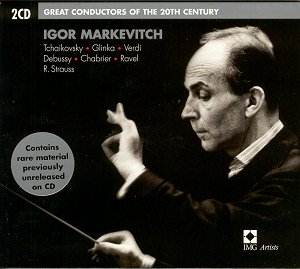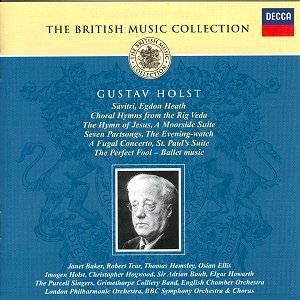 Composer: Igor Markevich
Composer: Igor Markevich
Works: Tchaikovsky: Manfred Symphony, op. 58; Glinka: A Life for the Tsar: Overture, Polonaise, Krakowiak, Waltz; Verdi: La Forza del Destino: Overture; Debussy: La Mer; Chabrier: España; Ravel: Daphnis and Chloë: Suite no. 2; Strauss: Till Eulenspiegels lustige Streiche, op. 28
Performers: Belgrade Opera Chorus, North German Radio Chorus, French National Radio Orchestra, Lamoureux Orchestra, London Symphony Orchestra, New Philharmonia Orchestra, North German Radio Symphony Orchestra, Spanish Radio and Television Symphony Orchestra
Recording: Live performances from various locations, 1956-1967
Label: EMI
Igor Markevich remains a compelling yet enigmatic figure in the pantheon of 20th-century conductors. His ability to conjure the essence of Russian music, despite his largely expatriate life, is showcased in this collection of live recordings that span the late 1950s to the late 1960s. This compilation not only reflects his interpretative prowess but also provides insight into the historical context of each work, particularly Tchaikovsky’s Manfred Symphony, a piece that resonates with the tumultuous emotions of its titular character and the Romantic era’s aesthetic.
The interpretation of Tchaikovsky’s Manfred Symphony stands out as a highlight of the recording, with Markevich’s approach revealing a visceral tension that captures the essence of the work. The London Symphony Orchestra under his baton provides a sound that is both raw and refined, a dichotomy that mirrors the turbulent psychological landscape of the symphony itself. From the outset, the strings deliver a biting, almost desperate quality, while the brass and woodwinds soar above with a clarity that is striking. The climactic moments are executed with an intensity that keeps the listener on edge, particularly in the finale where the savagery of the thematic material emerges with a compelling urgency.
Markevich’s interpretation choices reflect a keen understanding of orchestral balance, often pitting sections against one another rather than blending them into a homogenized sound. This is particularly evident in Debussy’s La Mer, where the orchestra’s dynamics mirror the tumult of the sea, presenting a restless, almost oppressive atmosphere. The crispness of the recording allows the listener to appreciate the intricate textures of Debussy’s orchestration, while Markevich’s pacing emphasizes the work’s inherent tension. However, one might argue that his relentless drive can occasionally overshadow the more lyrical moments, leaving the listener yearning for a touch of respite.
The sound quality of these live recordings, while not pristine by contemporary standards, captures the immediacy of the performances. There is a palpable energy that emanates from the orchestra, producing a sense of being in the concert hall. The engineering, though constrained by the technology of the time, manages to convey a satisfactory balance among the instruments. This quality lends a certain authenticity to the experience, allowing the listener to engage with the raw emotional power of the performances.
In juxtaposition to other notable recordings, Markevich’s interpretations can be seen as both exhilarating and exhausting. For instance, his approach to Ravel’s Daphnis and Chloë contrasts sharply with that of Sir Adrian Boult, who allows moments of introspection to wash over the listener. Markevich, however, seems intent on pushing the narrative forward with relentless momentum, sacrificing some of the work’s reflective qualities for sheer dramatic impact. While this approach is undeniably thrilling, it invites a reconsideration of the interpretative balance that can be struck in such lush orchestral works.
The Glinka pieces included offer a glimpse into a different facet of Markevich’s artistry. While they may not possess the same depth as the Tchaikovsky or Debussy selections, they serve to highlight his versatility and command over the orchestral palette. However, the decision to include these works might seem somewhat extraneous, as they do not elucidate any additional understanding of Markevich’s conducting style, which is more vividly expressed through the Russian repertoire.
Markevich’s fervent conducting style can be both a source of inspiration and a point of contention. The recordings presented here serve as important documents of a conductor whose legacy is as complex as the music he championed. The Tchaikovsky performances, in particular, are essential listening for anyone seeking to understand the nuances of interpretation during this period. The remaining selections provide intriguing insights into his artistic vision, albeit with varying degrees of success. This collection is an essential addition for those who wish to explore the multifaceted world of Igor Markevich and his indelible mark on 20th-century orchestral music.



